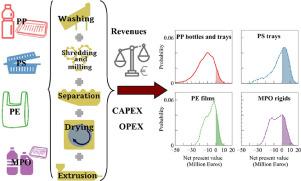Resources, Conservation and Recycling ( IF 13.2 ) Pub Date : 2021-04-19 , DOI: 10.1016/j.resconrec.2021.105607 Macarena Larrain , Steven Van Passel , Gwenny Thomassen , Bart Van Gorp , Trang T. Nhu , Sophie Huysveld , Kevin M. Van Geem , Steven De Meester , Pieter Billen

|
Increasing plastic recycling rates is crucial to tackle plastic pollution and reduce consumption of fossil resources. Recycling routes for post-consumer plastic fractions that are technologically and economically feasible remain a challenge. Profitable value chains for recycling mixed film and tray-like plastics have hardly been implemented today, in sharp contrast to recycling of relatively pure fractions such as polyethylene terephthalate and high-density polyethylene bottles.
This study examines the economic feasibility of implementing mechanical recycling for plastic waste such as polypropylene, polystyrene, polyethylene films and mixed polyolefins. In most European countries these plastic fractions are usually incinerated or landfilled whilst in fact technologies exist to mechanically recycle them into regranulates or regrinds.
Results show that the economic incentives for the recycling of plastic packaging depend predominantly on the product price and product yield. At current price levels, the most profitable plastic fraction to be recycled is PS rigids, with an internal rate of return of 14%, whereas the least profitable feed is a mixed polyolefin fraction with a negative internal rate of return in a scenario with steadily rising oil prices. Moreover, these values would be substantially reduced if oil prices, and therefore plastic product prices decrease. Considering a discount rate of 15% for a 15-year period, mechanical recycling is not profitable if no policy changes would be imposed by governments. Clearly low oil prices may jeopardize the mechanical recycling industry, inducing the need for policies that would increase the demand of recycled products such as imposing minimal recycled content targets.
中文翻译:

机械回收有挑战性的消费后塑料包装废料的技术经济评估
提高塑料回收率对于解决塑料污染和减少化石资源的消耗至关重要。技术上和经济上可行的消费后塑料馏分的回收途径仍然是一个挑战。与回收相对纯净的部分(例如聚对苯二甲酸乙二酯和高密度聚乙烯瓶)相比,如今几乎没有实施用于回收混合膜和托盘状塑料的有利可图的价值链。
这项研究研究了对塑料废料(例如聚丙烯,聚苯乙烯,聚乙烯薄膜和混合聚烯烃)实施机械回收的经济可行性。在大多数欧洲国家中,这些塑料馏分通常被焚化或填埋,而实际上,已有技术可以将其机械回收成颗粒或再磨碎。
结果表明,回收塑料包装的经济动机主要取决于产品价格和产品产量。在当前价格水平下,可循环利用的利润最高的塑料级分是PS硬质合金,内部收益率为14%,而利润最低的是混合聚烯烃级分,在稳定增长的情况下内部收益率为负石油价格。此外,如果油价下跌,这些数值将大大降低,因此塑料产品价格下跌。考虑到15年期的15%折现率,如果政府不采取任何政策更改,则机械回收将无法盈利。显然,低油价可能会危害机械回收行业,



























 京公网安备 11010802027423号
京公网安备 11010802027423号